In this edition of court judgements review, we look at Supreme Court’s order that Confessional statement is admissible in evidence as per Section 27 of the Evidence Act and cannot be rejected because it was recorded by a translator in a language not known to the accused, that Government employees can’t claim overtime allowances under Factories Act, Bombay HC ruling that provisions of Domestic Violence Act can be invoked irrespective of where the domestic violence took place.
SC: Confessional statement is admissible in evidence as per Section 27 of the Evidence Act and cannot be rejected because it was recorded by a translator in a language not known to the accused
Siju Kurian, a Malayalee, was a labourer working in the farmhouse of the deceased Jose Kafan. Kurian was accused of having entered the farmhouse and murdering the deceased. He was also accused of stealing and selling the articles in the farmhouse and of selling the land of said farmhouse to others to make undue monetary gain. He was also accused of concealing the evidence by hiding the body of the deceased, his clothes, and the iron rod used for murder. Following the complaint filed by the deceased’s son, the police initiated proceedings against the accused. The accused had confessed to the crime and led the police to where the body was hidden during the enquiry.
In this case, the Trial Court had concluded that the prosecution did not establish the guilt of the accused beyond reasonable doubt and acquitted him. However, in an appeal, the High Court reversed the Trial Court’s acquittal noting that there was an erroneous appreciation of evidence and accused the convict. In the appeal, Siju Kurian vs. State of Karnataka, before the Apex Court, the appellant’s counsel argued that the confession statement of the appellant-accused was not admissible evidence under Section 27 of the Evidence Act, as the method of recording the confession was quite unusual. To translate the confessional statement from Malayalam for the Karnataka Police, a translator’s help was taken. The translation was made from Malayalam to Tamil and then written down in Kannada.
The Supreme Court Bench of Justices Surya Kant and Aravind Kumar held that the ultimate test was if the statement was noted down as told by the accused. They added that a confessional statement is admissible in evidence as per Section 27 of the Evidence Act and that it would not be rejected merely because it was not recorded in the accused’s mother tongue. The Bench also noted that it did not find any irregularity in the circumstantial evidence relied on by the prosecution and upheld the conviction of the accused and dismissed the appeal.
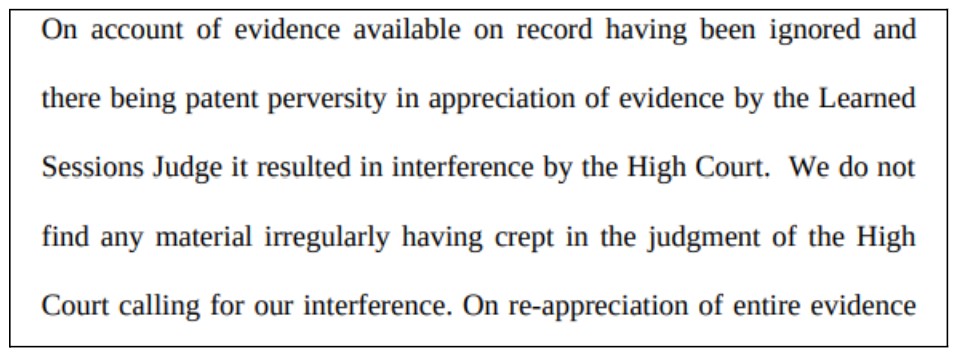
SC: Government employees can’t claim overtime allowances under Factories Act
In Security Printing & Minting Corporation of India Ltd. & Others, etc vs. Vijay D. Kasbe & Others, etc, the issue before the Supreme Court was whether the employees working as supervisors at the Security Printing & Minting Corporation of India are entitled to double overtime allowance as per Chapter VI of the Factories Act 1948. The Security Printing & Minting Corporation of India is a company under the Ministry of Finance that is responsible for printing currency notes. The appeal was raised following the Bombay High Court’s decision that the employees were entitled to overtime benefits as per the Factories Act.
The Supreme Court bench of Justices V Ramasubramanian and Pankaj Mithal clearly explained 3 different types of employment such as those which require protection under legal welfare, those which are governed by terms of the contract, and employment of persons to civil posts or in the civil services of the Union or the State. The Bench observed that unlike those employed in factories and industrial establishments, persons in public service who are holders of civil posts or in the civil services of the Union or the State are required to place themselves at the disposal of the Government all the time and that the respondents had no scope to seek double overtime allowances.
Noting that workers in factories who did not enjoy automatic wage revision while those holding civil posts or in the civil services of the State enjoy certain privileges, the Supreme Court held that the Central Administrative Tribunal, as well as the High Court, did not test the claims made by the respondents. Further, the distinction between persons in Government service and those in private service and the effect of the statutory rules upon the conditions of service of the respondents, including their liability to work for extra hours was not considered by the Tribunal or High Court, according to the Bench. The Supreme Court Bench, thus, set aside the Bombay High Court’s orders and held that government employees cannot claim double overtime allowance as per the Factories Act.
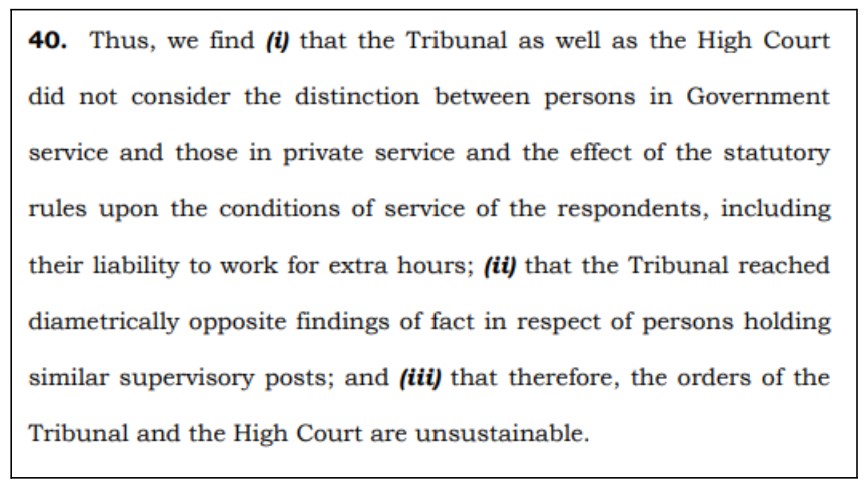
NGT: Firecrackers, amplifiers, music systems and playing Dhols are banned around Fatehsagar Lake
In Anil Mehta vs. State of Rajasthan & Others before the National Green Tribunal, the issue raised was to protect the wetland ecosystem of Fatehsagar Lake and curb pollution in the area. It was stated that the local communities residing near the area were persistently affected by air pollution caused by the playing of loud music via sound amplifiers, bursting crackers, and the beating of dhols, nagadas, etc, by private groups during the day for religious events and weddings. NGT stated that a substantial issue of the environment was raised and constituted an expert committee to file a report on the issue.
The committee report noted that the noise pollution did exceed the prescribed limits in some areas. It noted that firecrackers were used in residential and commercial areas violating the ambient noise quality. Permissible limits are bound to be non-complied with in such situations and the effect of the same would persist for a long distance, violating the noise standards at a faraway place too. The committee made a few recommendations like an application for the public to lodge their grievance, installation of CCTVs, display of boards on ill-effect of noise pollution, a ban on music systems in vehicles and processions, etc. The NGT Bench of Justices Sheo Kumar Singh and expert member Dr Arun Kumar Verma called for enforcing the committee’s recommendations and directed the Collector/Municipal Corporation to file their responses. The matter will be next heard on 17 May 2023.
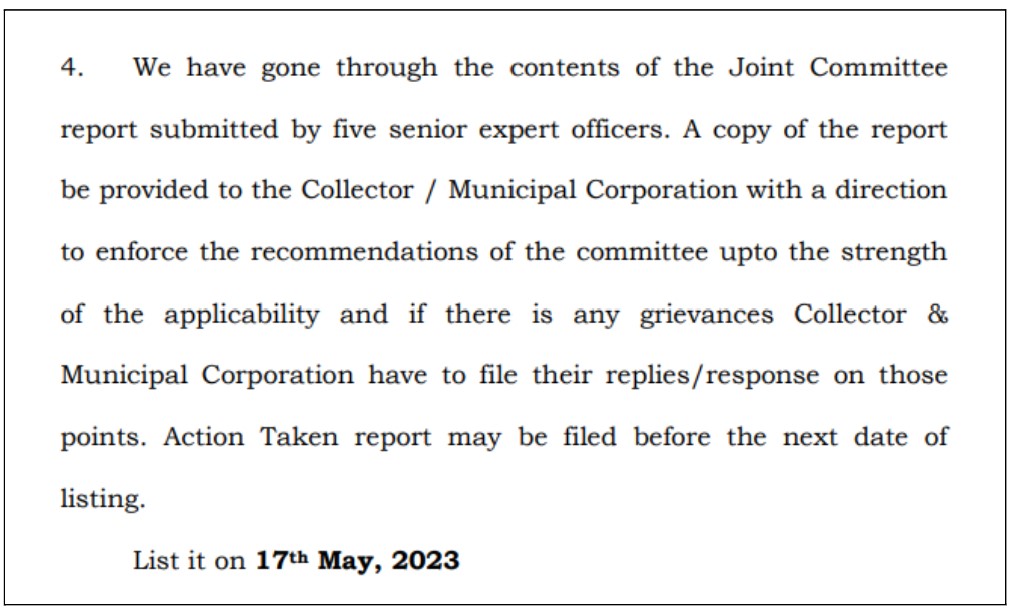
Kerala HC: It is not proper to grant anticipatory bail to a person absconding from India well aware of the non-bailable offence registered against them
In Anu Mathew vs. State of Kerala, the accused was charged with morphing photographs of a minor girl and posting them on pornographic websites, sending threatening messages, and defamation of the child and mother. The accused was not in India and had filed an Anticipatory application under section 438 of Cr. P.C before the Kerala High Court. The issue before the Kerala High Court was whether an accused is eligible for interim bail under Section 438 (1) of the Cr.P.C. after they absconded from the country knowing that a non-bailable offence was registered against them.
The High Court Bench of the division bench of Justices Alexander Thomas and C S Sudha noted that if such an accused had fled from India knowing about the registration of a non-bailable offence, then thereafter, he may technically have the locus standi to maintain a pre-arrest bail plea. However, if the Court is convinced that he has absconded and fled away from the law enforcement agencies, then it may not be the right and proper exercise of jurisdiction to grant interim bail to such an accused who is abroad. Further, the Bench added that the requirements that the accused must be available for questioning by a police officer whenever necessary and must not leave India without the court’s prior approval should be considered.
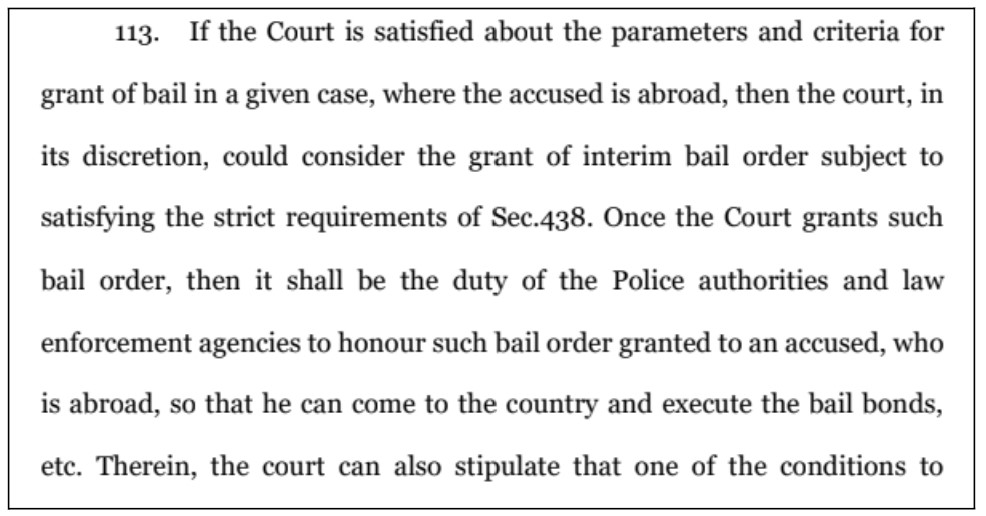
Bombay HC: Section 27 (1) (a) and (b) of Domestic Violence Act can be invoked irrespective of where the domestic violence took place
In a criminal application before the Nagpur Bench of Bombay High Court, the Applicant is the respondent in the complaint filed before the Magistrate and the non-applicant is the complainant. Following their marriage in 2020, both the complainant and her husband left for Germany. After going to Germany, she was subjected to domestic violence by her husband. Even during her stay with the in-laws, she claimed that she was subjected to humiliation for not performing the marriage up to their standards. She was finally sent back to India by her husband, the respondent following which she filed the case under the Protection of Women from Domestic Violence Act, 2005.
The husband then filed an application to dismiss the charges against him on the grounds that the alleged acts had taken place in Germany and not in India and so the Indian Courts did not have the jurisdiction. In response, the wife filed that the mental stress and trauma carried by her from Germany continued in India. The Additional Chief Judicial Magistrate had rejected the husband’s application following which he approached the High Court.
The Bombay High Court Bench of Justice GA Sanap held that judicial magistrates in India can take cognizance of domestic violence committed on foreign soil under the Domestic Violence Act, 2005. It added that sections 27(1)(a) and (b) of the Act are applicable irrespective of the place of cause of action. That is, it does not matter where domestic violence occurred.
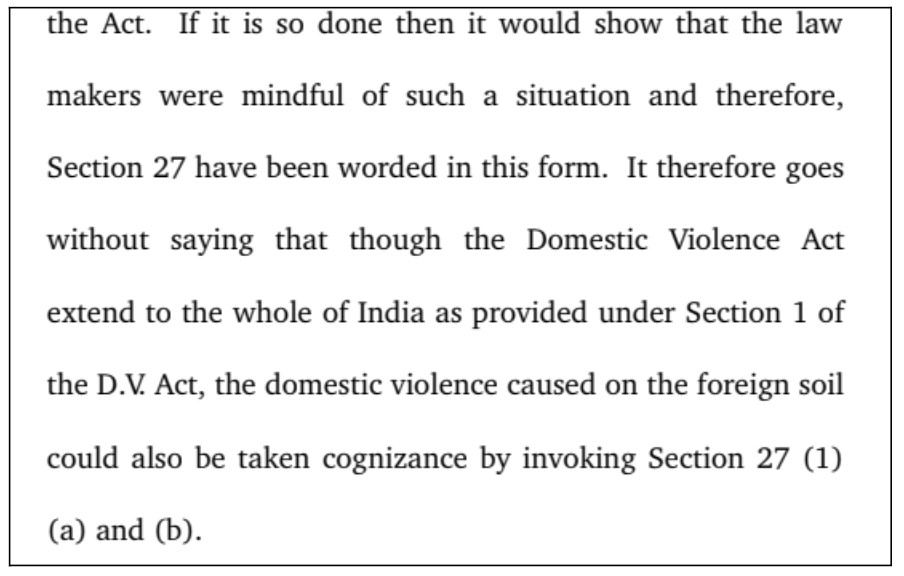
Featured Image: Review of Court judgements


